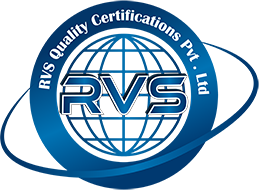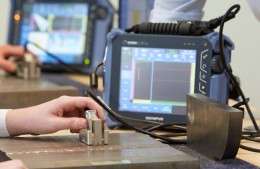I have been out of industrial activity after completing my graduation for about 2 years, then RVS Quality Certifications Pvt Ltd has changed my outlook on my career. Adopting a course in NDT has helped me launch my career.
3 Hidden Advantages of Non Destructive Testing Methods
- By: Admin
bkwl.jpg)
In the realm of quality assurance and safety protocols, non-destructive testing (NDT) methods have emerged as indispensable tools for ensuring structural integrity and operational efficiency. While the primary goal of NDT is to detect flaws and defects without causing damage to the tested material or component, there are several hidden advantages that make it a preferred choice for industries across the globe. As a renowned ISO certification training and consulting firm, RVS Quality Certifications Pvt. Ltd. understands the significance of Non Destructive Testing Services in maintaining high standards of quality and safety. Let's explore three hidden advantages of non-destructive testing methods and why they are essential for industries today.
Cost-effectiveness and Efficiency
One of the most significant hidden advantages of non-destructive testing methods is their cost-effectiveness and efficiency. Unlike traditional destructive testing methods, which often require the destruction of test samples to assess their integrity, NDT allows for the inspection of materials and components without causing any damage. This means that manufacturers can conduct thorough quality assessments without incurring the costs associated with material loss or replacement.
Additionally, non-destructive testing methods are typically faster and more efficient than destructive techniques, allowing for quicker turnaround times and reduced downtime for production facilities. With NDT, manufacturers can identify defects and flaws in real-time, enabling them to address issues promptly and prevent costly delays or setbacks in production processes. As reliable Forging Consultants, RVS Quality Certifications Pvt. Ltd. recognises the importance of cost-effective and efficient quality assurance methods, making NDT an invaluable tool for industries seeking to optimise their operations.
Enhanced Safety and Risk Mitigation
Another hidden advantage of non-destructive testing methods is their ability to enhance safety and mitigate risks in various industries. By identifying defects and weaknesses in materials and components, NDT helps prevent potential failures and accidents that could lead to injury or loss of life. Whether it's ensuring the structural integrity of a bridge, the reliability of a pipeline, or the safety of a nuclear power plant, NDT plays a critical role in safeguarding infrastructure and protecting public safety.
Furthermore, non-destructive testing methods allow for the detection of hidden flaws that may not be visible to the naked eye, providing a comprehensive assessment of the integrity of tested materials. This proactive approach to quality assurance helps industries identify potential risks before they escalate into serious incidents, ultimately saving lives, minimising liabilities, and preserving reputations. As providers of non-destructive testing services, we are committed to helping industries prioritise safety and mitigate risks through comprehensive quality assurance measures.
Sustainability and Environmental Responsibility
In addition to cost-effectiveness and safety benefits, non-destructive testing methods also contribute to sustainability and environmental responsibility. By minimising material waste and reducing the need for resource-intensive testing processes, NDT helps industries operate in a more environmentally friendly manner. This aligns with global efforts to reduce carbon footprints and promote sustainable practices across various sectors.
Furthermore, NDT enables industries to extend the lifespan of materials and components by identifying defects early on and implementing appropriate remedial measures. This prolongs the useful life of assets, reduces the frequency of replacements, and minimises the environmental impact associated with manufacturing and disposal processes. As forging consultants and advocates for sustainable practices, it recognises the role of NDT in promoting environmental stewardship and supporting the transition towards a more sustainable future.
In conclusion, non-destructive testing methods offer a multitude of hidden advantages that go beyond their primary purpose of flaw detection. From cost-effectiveness and efficiency to enhanced safety, risk mitigation, and environmental responsibility, NDT plays a crucial role in ensuring quality, reliability, and sustainability across various industries. As providers of ISO certification training and consultancy services, it champions the adoption of non-destructive testing methods as essential tools for achieving excellence and compliance in today's ever-evolving landscape.
RVS is the absolute best value to learn Aerospace NDT Training Course to nurture my skills. I am completely satisfied with how affordable the service they provide. Thanks RVS Team for constant support.
I would like to thank RVS for their time and patience in helping me learn and grow with my NDT courses. I was able to work and learn at the same time, with no pressure. I would recommend RVS to anyone seeking to work and take courses at the same time. I accomplished the course and today I'm a Certified PCN Level II UT engineer.
RVS helped our new hires to acquire the comprehensive training they need, as well as for refresher courses for our current employees. This has worked well for us in obtaining the necessary NDT certifications.
Just a few lines to express my gratitude for your outstanding service over the past year. We would have no issue in referring to your organisation because of your customer devotion and professionalism.
NDT is employed in a wide range of industries, including oil and gas, aerospace, energy, power, nuclear, and transportation, with nearly endless career opportunities. A job in NDT is extremely dynamic, and ongoing training is required.
One of the advantages of a four-year NDT programme is that students can study in a more focused and instructive manner. For graduates, this offers up a plethora of new NDT employment options, including quality assurance, management, engineering design, research, NDT training, and teaching.
Non-Destructive Testing (NDT) Training Courses - Levels 1, 2 and 3.
The PCN (Personnel Certification in Non-Destructive Testing) is a programme that meets the BS EN ISO 9712 requirements for NDT technicians and supervisors. It is founded in the United Kingdom, but it has an impact on a number of countries in the European Union.








